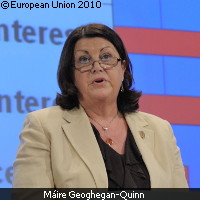Science overtakes sport in Europe!
Close to 80% of Europeans are interested in science and technological developments, according to a new Eurobarometer survey. For comparison, just 65% claim to be interested in sports news. 'Perhaps a World Cup of science would get even more people round the TV than the football one does!' quipped the European Commissioner for Research, Innovation and Science, Máire Geoghegan-Quinn, presenting the results of the survey. Overall, the Eurobarometer findings are rather positive. Some 61% say they are well or moderately well informed on new scientific discoveries; 75% agree that thanks to science and technology, there will be more opportunities for future generations; and 58% believe that youngsters who are interested in science have better chances of getting a job. Moreover, it seems that Europeans want even more information on and involvement in science. Over half (57%) complain that scientists do not put enough effort into informing the public about new scientific and technological developments. On scientific decision-making, 29% believe that the public opinion should be considered when making decisions about science and technology, and a further 14% call for public opinion to be binding in these situations. Just 7% believe that the public does not need to be involved in scientific decision-making at all. Elsewhere, two thirds of respondents criticised governments for not doing enough to get young people into science, and three quarters opined that governments should support specific measures to boost the numbers of women in science. Furthermore, many believe that if there were more women in top research positions, this would improve the way research is conducted. 'I am sure they are right,' commented Mrs Geoghegan-Quinn. 'This is not just a question of equal opportunities, but of using all of the talent we have available in Europe.' On the ethical front, 66% of respondents agreed that scientists should be allowed to experiment on mice if the work could help solve human health problems. This figure fell to 44% for experiments on dogs and monkeys. Turning to the EU's involvement in research, respondents expressed strong support for the EU's approach to research. 'More cooperation between governments, mobility of researchers, cooperation with the US and emerging and developing nations, closer collaboration between science and industry - all these score very highly,' said the Commissioner. 'What is encouraging is that respondents to this survey - the general public - could immediately see that these steps to boost European research are common sense.' Quizzed on which areas the EU should prioritise in its research programmes, respondents put health issues first, followed by energy and the environment. 'The success of the Europe 2020 Strategy depends on cutting edge science to keep Europe competitive. In turn, that means ordinary Europeans need to back science and keep the pressure up on government and on industry to invest in it,' concluded Mrs Geoghegan-Quinn. 'These results show a very high awareness of the importance of science. But they also show that both politicians - like me - and scientists themselves need to explain better what we are doing and why.' The Eurobarometer survey is the result of face-to-face interviews with over 30,000 people in 32 European countries (the 27 EU Member States plus Croatia, Iceland, Norway, Switzerland and Turkey) carried out earlier this year.



